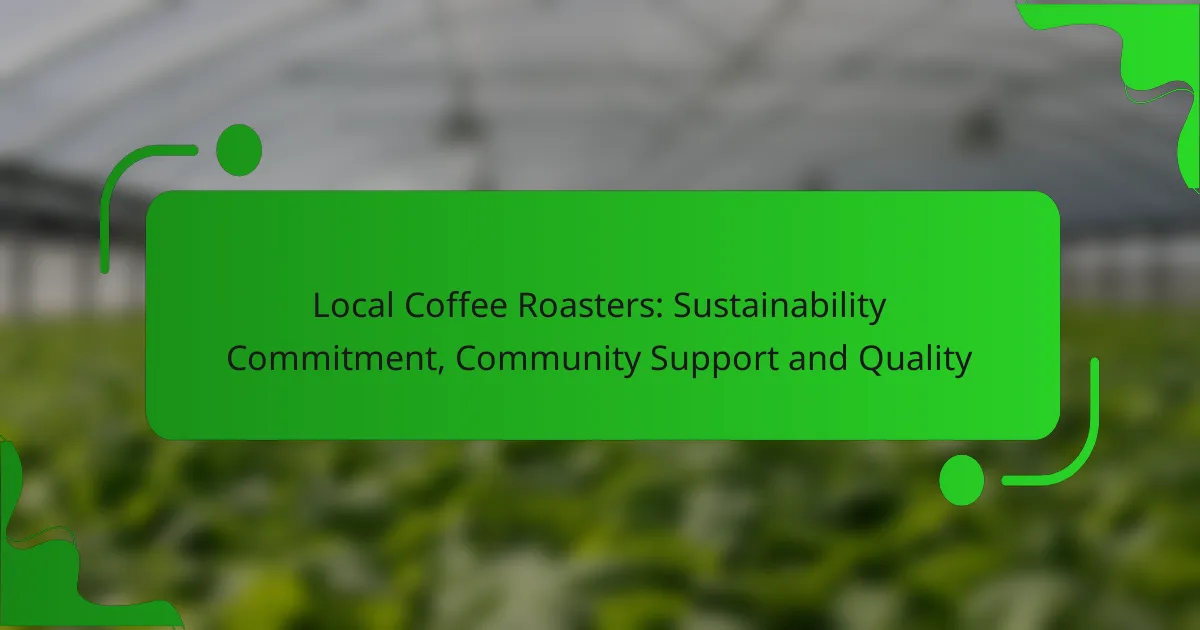Local coffee roasters in Los Angeles are dedicated to sustainability, community support, and exceptional quality. By utilizing organic beans and eco-friendly practices, they minimize their environmental impact while fostering direct trade relationships that ensure the highest quality coffee. Their commitment extends beyond the cup, as they actively engage with the community through charitable initiatives and events that celebrate local culture.

How do local coffee roasters support sustainability in Los Angeles?
Local coffee roasters in Los Angeles actively promote sustainability through various practices that minimize environmental impact and support ethical sourcing. These efforts include using organic beans, eco-friendly packaging, energy-efficient roasting methods, and partnerships with sustainable farms.
Use of organic beans
Many local coffee roasters prioritize the use of organic beans, which are grown without synthetic pesticides or fertilizers. This not only benefits the environment but also enhances the quality of the coffee. Organic farming practices help maintain soil health and promote biodiversity, which is crucial for sustainable agriculture.
When choosing organic coffee, look for certifications such as USDA Organic or Fair Trade, which indicate adherence to strict environmental and social standards. Supporting these roasters contributes to a healthier ecosystem and promotes responsible farming practices.
Eco-friendly packaging
Eco-friendly packaging is another key aspect of sustainability for local coffee roasters. Many are shifting away from plastic and opting for biodegradable or recyclable materials. This reduces waste and minimizes the carbon footprint associated with packaging production and disposal.
Roasters often use materials like compostable bags or glass containers, which can be reused or recycled. When purchasing coffee, consider asking about the packaging options to support those that prioritize environmental responsibility.
Energy-efficient roasting methods
Energy-efficient roasting methods are essential for reducing the carbon footprint of coffee production. Local roasters in Los Angeles are increasingly adopting technologies that consume less energy, such as electric or hybrid roasters. These methods not only lower energy costs but also produce less emissions compared to traditional gas-powered roasters.
Additionally, some roasters implement heat recovery systems that capture and reuse heat generated during the roasting process. This innovation further enhances energy efficiency and contributes to sustainable practices in coffee roasting.
Partnerships with sustainable farms
Local coffee roasters often establish partnerships with sustainable farms to ensure ethical sourcing and support local economies. These collaborations allow roasters to source high-quality beans while promoting fair labor practices and environmental stewardship.
By working directly with farmers, roasters can ensure that their beans are grown sustainably and that farmers receive fair compensation. This not only strengthens the local coffee community but also fosters a more sustainable supply chain that benefits everyone involved.

What community initiatives do local coffee roasters engage in?
Local coffee roasters often participate in various community initiatives that strengthen their ties with the neighborhood and promote sustainability. These initiatives can include collaborations with charities, support for local artists, and hosting community events and workshops.
Local charity collaborations
Many local coffee roasters partner with charities to support causes that resonate with their values and community needs. These collaborations may involve donating a percentage of sales, organizing fundraising events, or providing coffee for charity functions. For instance, a roaster might contribute to local food banks or environmental organizations, helping to address pressing social issues.
When choosing a charity to collaborate with, roasters often consider the impact of their contributions and the alignment of their mission with community goals. Engaging customers in these initiatives can also enhance loyalty and awareness of the roaster’s commitment to social responsibility.
Support for local artists
Local coffee roasters frequently showcase the work of local artists, providing them with a platform to display their creations. This support can take the form of art exhibitions, live music performances, or even featuring local artisans’ products in the café. By doing so, roasters not only beautify their space but also foster a sense of community and cultural appreciation.
Collaborating with artists can enhance the roaster’s brand identity and attract customers who value local culture. Offering a space for artistic expression can also create a vibrant atmosphere that encourages patrons to linger and engage with the community.
Community events and workshops
Hosting community events and workshops is another way local coffee roasters engage with their neighborhoods. These events can range from coffee tastings and brewing classes to sustainability workshops that educate customers about ethical sourcing and environmental practices. Such initiatives help to build a knowledgeable customer base and promote the roaster’s commitment to quality and sustainability.
To maximize participation, roasters should consider scheduling events at convenient times and promoting them through social media and local networks. Offering incentives, such as discounts on coffee or merchandise for attendees, can also encourage community involvement and strengthen relationships with customers.

How do local coffee roasters ensure quality in their products?
Local coffee roasters ensure quality by focusing on sourcing, processing, and tasting methods that highlight the unique characteristics of their beans. They prioritize direct trade relationships, implement rigorous quality control processes, and conduct expert cupping sessions to maintain high standards.
Direct trade sourcing
Direct trade sourcing involves local roasters purchasing coffee beans directly from farmers, ensuring fair prices and better quality. This approach fosters strong relationships with producers, allowing roasters to understand the growing conditions and practices that affect flavor.
By eliminating middlemen, roasters can often pay a premium for exceptional beans, which translates to higher quality products for consumers. This method also supports sustainable farming practices and community development in coffee-growing regions.
Quality control processes
Quality control processes are essential for maintaining the integrity of coffee products. Local roasters typically implement multiple checks throughout the roasting process, from green bean inspection to final product tasting.
Common practices include moisture content analysis, defect sorting, and roast profiling to ensure consistency. Roasters may also adhere to industry standards, such as those set by the Specialty Coffee Association, to benchmark their quality against recognized norms.
Expert cupping sessions
Expert cupping sessions are critical for evaluating the flavor profiles of coffee. During these sessions, roasters taste and assess various coffees to identify unique characteristics and ensure they meet quality expectations.
Cupping involves brewing coffee in a standardized way, allowing for a fair comparison of different beans. Local roasters often invite industry experts to participate, providing valuable feedback and fostering a culture of continuous improvement in their offerings.

What are the key criteria for choosing a local coffee roaster?
When selecting a local coffee roaster, consider their commitment to sustainability, community involvement, and the quality of their coffee. These factors not only influence the taste but also reflect the roaster’s values and practices.
Roasting techniques
Roasting techniques significantly impact the flavor profile of coffee. Look for roasters that employ methods such as air roasting or drum roasting, which can enhance the natural flavors of the beans. Each technique has its advantages; for instance, air roasting tends to produce a cleaner taste, while drum roasting may yield a fuller body.
Additionally, inquire about the roast levels offered, ranging from light to dark. Light roasts often highlight fruity and floral notes, while dark roasts provide a bolder, smokier flavor. Understanding these nuances can help you choose a roaster that aligns with your taste preferences.
Customer reviews
Customer reviews are a valuable resource when evaluating local coffee roasters. Look for feedback on platforms like Yelp or Google Reviews, focusing on comments regarding flavor consistency, freshness, and customer service. High ratings in these areas often indicate a reliable roaster.
Pay attention to recurring themes in reviews, such as the quality of the beans or the knowledge of the staff. This can give you insights into the roaster’s overall commitment to excellence and customer satisfaction.
Location and accessibility
Location and accessibility are practical considerations when choosing a local coffee roaster. Ideally, select a roaster that is conveniently located near your home or workplace, making it easier to visit regularly. Many roasters also offer online ordering, which can be a great option for those with busy schedules.
Consider the roaster’s hours of operation as well. Some may have limited hours or only operate on weekdays, which could affect your ability to purchase coffee. Checking their website or calling ahead can save you time and ensure you have access to their products when you need them.

How do local coffee roasters price their products?
Local coffee roasters typically price their products based on several key factors, including the cost of sourcing beans, operational expenses, and their commitment to sustainability and quality. Understanding these elements can help consumers appreciate the value behind their favorite brews.
Cost of sourcing beans
The cost of sourcing coffee beans is a significant factor in pricing. Local roasters often prioritize high-quality, ethically sourced beans, which can range from moderate to high prices depending on the origin and quality. For instance, specialty beans from regions like Colombia or Ethiopia may cost more due to their unique flavors and the labor-intensive processes involved in cultivation.
Additionally, many roasters engage directly with farmers to ensure fair trade practices, which may further increase costs but supports sustainable farming. This direct relationship often leads to better quality and fresher beans, which can justify higher retail prices.
Operational expenses
Operational expenses encompass various costs such as rent, utilities, labor, and equipment maintenance. Local coffee roasters must account for these ongoing expenses when setting prices. For example, a small roastery in an urban area may face higher rent costs than one located in a rural setting, impacting the final price of their coffee.
Moreover, investing in quality roasting equipment and training staff can lead to better product quality, but these costs must be balanced against the need to remain competitive in the market. Roasters often analyze their expenses to find a pricing strategy that covers costs while still appealing to customers.



